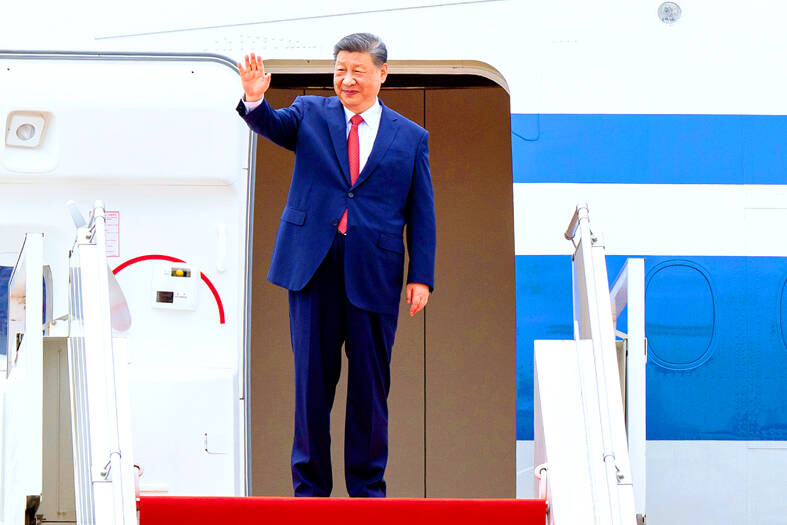Chinese President Xi Jinping (習近平) yesterday completed a two-day state visit to Cambodia, capping a three-nation tour that included stops in Vietnam and Malaysia at a time when all three Southeast Asian countries are facing economic challenges from US President Donald Trump’s tariff proposals.
China has been strongly increasing its influence in the region over the past decade, largely by exercising its substantial economic leverage.
Cambodia faces among the highest “reciprocal” tariff rates proposed by the US. In addition to Trump’s universal 10 percent tariff, it faces the threat of a 49 percent tariff once the 90-day pause expires. For Vietnam, the tariff would be 46 percent and for Malaysia, 24 percent.

Photo: AKP via AP
“This milestone visit not only reaffirmed the unwavering commitment to the iron-clad friendship between Cambodia and China, but also further strengthened and deepened the Comprehensive Strategic Partnership and win-win cooperation between the two countries,” Cambodia’s Ministry of Foreign Affairs said in a statement.
Xi and Cambodian Prime Minister Hun Manet also presided over the signing of 37 documents covering investment, trade, education, finance, information, youth work, agriculture, health, water resources, tourism, women’s affairs and other subjects.
Beijing’s strong support allows Cambodia to largely disregard Western criticisms regarding its government’s human rights record and suppression of political opposition. Cambodia for its part generally supports China’s stance on its widely disputed territorial claims in the South China Sea and other controversial issues.
“The Cambodian side reiterated its resolute adherence to the one-China policy and that Taiwan is an inalienable part of China’s territory,” the ministry said. “Cambodia also expressed opposition to any attempts of interference in the internal affairs of China.”
The statement also declared that “both sides agreed to further strengthen the cooperation mechanism between the armed forces of the two countries.”
Beijing helped fund an expansion of the Ream Naval Base on Cambodia’s southern coast, raising worries it could become a strategic outpost for the Chinese navy in the Gulf of Thailand.
Cambodia has repeatedly denied any agreement granting China special privileges or the establishment of a foreign military base.

AGING: As of last month, people aged 65 or older accounted for 20.06 percent of the total population and the number of couples who got married fell by 18,685 from 2024 Taiwan has surpassed South Korea as the country least willing to have children, with an annual crude birthrate of 4.62 per 1,000 people, Ministry of the Interior data showed yesterday. The nation was previously ranked the second-lowest country in terms of total fertility rate, or the average number of children a woman has in her lifetime. However, South Korea’s fertility rate began to recover from 2023, with total fertility rate rising from 0.72 and estimated to reach 0.82 to 0.85 by last year, and the crude birthrate projected at 6.7 per 1,000 people. Japan’s crude birthrate was projected to fall below six,

Conflict with Taiwan could leave China with “massive economic disruption, catastrophic military losses, significant social unrest, and devastating sanctions,” a US think tank said in a report released on Monday. The German Marshall Fund released a report titled If China Attacks Taiwan: The Consequences for China of “Minor Conflict” and “Major War” Scenarios. The report details the “massive” economic, military, social and international costs to China in the event of a minor conflict or major war with Taiwan, estimating that the Chinese People’s Liberation Army (PLA) could sustain losses of more than half of its active-duty ground forces, including 100,000 troops. Understanding Chinese

US President Donald Trump in an interview with the New York Times published on Thursday said that “it’s up to” Chinese President Xi Jinping (習近平) what China does on Taiwan, but that he would be “very unhappy” with a change in the “status quo.” “He [Xi] considers it to be a part of China, and that’s up to him what he’s going to be doing, but I’ve expressed to him that I would be very unhappy if he did that, and I don’t think he’ll do that. I hope he doesn’t do that,” Trump said. Trump made the comments in the context

SELF-DEFENSE: Tokyo has accelerated its spending goal and its defense minister said the nation needs to discuss whether it should develop nuclear-powered submarines China is ramping up objections to what it sees as Japan’s desire to acquire nuclear weapons, despite Tokyo’s longstanding renunciation of such arms, deepening another fissure in the two neighbors’ increasingly tense ties. In what appears to be a concerted effort, China’s foreign and defense ministries issued statements on Thursday condemning alleged remilitarism efforts by Tokyo. The remarks came as two of the country’s top think tanks jointly issued a 29-page report framing actions by “right-wing forces” in Japan as posing a “serious threat” to world peace. While that report did not define “right-wing forces,” the Chinese Ministry of Foreign Affairs was